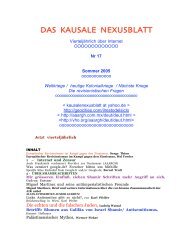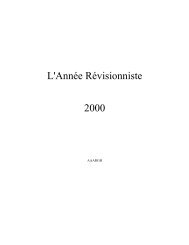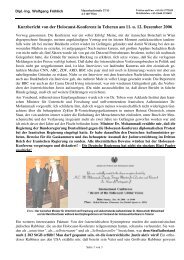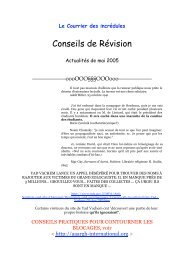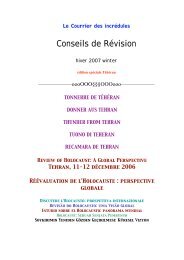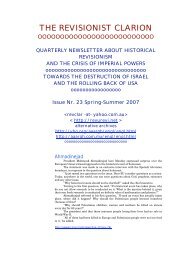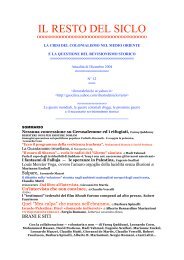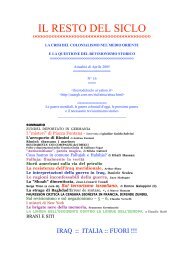Numéro 60--- ÃTà 2007 - Vho
Numéro 60--- ÃTà 2007 - Vho
Numéro 60--- ÃTà 2007 - Vho
Create successful ePaper yourself
Turn your PDF publications into a flip-book with our unique Google optimized e-Paper software.
GAZETTE DU GOLFE ET DES BANLIEUES / <strong>60</strong> / ÉTÉ <strong>2007</strong><br />
normally sedate "Book TV" program on C-Span2, being called a racist and an anti-Semite by an<br />
indignant caller.<br />
Such backlash is triggered by Mr. Carter's assertions that pro-Israel lobbyists have stifled<br />
debate in the United States over the Israeli-Palestinian conflict; that Israelis are guilty of human<br />
rights abuses in Israeli-occupied Palestinian territories; and that the editorial pages of American<br />
newspapers rarely present anything but a pro-Israel viewpoint. But the bulk of outrage has come<br />
from his use of the word apartheid in the title, apparently equating the plight of today's<br />
Palestinians to the former victims of government-mandated racial separation in South Africa.<br />
Jewish groups have responded angrily, saying that Mr. Carter's claims are dangerous and<br />
anti-Semitic. But Mr. Carter is steadfastly defending the book, saying he believes there is a valid<br />
comparison between Israelis and the white South Africans who oppressed blacks. "It was<br />
obviously going to be somewhat provocative," Mr. Carter said of the title. "I could have said 'A<br />
New Path to Peace' or something like that." But Mr. Carter said he felt apartheid was the most<br />
pertinent word he could use, and in retrospect he would not change any of the book's content.<br />
His book details his version of the history of the Israeli-Palestinian conflict, beginning with<br />
the 19th century. He concludes that Israel is now following a "system of apartheid," in which<br />
Israelis are dominant and Palestinians are deprived of basic human rights.<br />
The book was published Nov. 14 by Simon & Schuster. It is at No. 7 on The New York<br />
Times's best-seller list, and has sold more than 68,000 copies, according to Nielsen BookScan,<br />
which measures <strong>60</strong> to 70 percent of a book's sales. In the interview Mr. Carter defined apartheid<br />
as the "forced separation of two peoples in the same territory with one of the groups dominating<br />
or controlling the other." Under that definition, he said, the United States practiced a form of<br />
apartheid during its "separate but equal" years of segregation.<br />
Opposition to the book has appeared widely on newspaper editorial pages, including in The<br />
Washington Post and The Atlanta Journal-Constitution.<br />
In an essay titled "It's Not Apartheid," Michael Kinsley lambasted the book in The<br />
Washington Post on Tuesday. "It's not clear what he means by using the loaded word 'apartheid,'<br />
since the book makes no attempt to explain it, but the only reasonable interpretation is that<br />
Carter is comparing Israel to the former white racist government of South Africa," Mr. Kinsley<br />
wrote.<br />
In The Jerusalem Post, David A. Harris, the executive director of the American Jewish<br />
Committee, called the book "outlandishly titled." Abraham H. Foxman, the national director of the<br />
Anti-Defamation League, said: "The title is to de-legitimize Israel, because if Israel is like South<br />
Africa, it doesn't really deserve to be a democratic state. He's provoking, he's outrageous, and<br />
he's bigoted."<br />
This week the Anti-Defamation League began running ads criticizing Mr. Carter in major<br />
newspapers, including The New York Times, The Washington Post, The Los Angeles Times and<br />
The Atlanta Journal-Constitution. Mr. Carter has also fought off charges that he misappropriated<br />
material in a book by Dennis Ross, a former envoy to the Middle East who is now a foreign affairs<br />
analyst for Fox News. And Kenneth W. Stein, an adviser to Mr. Carter, resigned last week from<br />
the Carter Center after calling the book "replete with factual errors, copied materials not cited,<br />
superficialities, glaring omissions and simply invented segments."<br />
Mr. Carter contradicted those claims, saying he had never read Mr. Ross's book The Missing<br />
Peace. "I wrote every word myself," he said. "I didn't plagiarize anything." Mr. Carter has a<br />
longstanding interest in the Middle East conflict. When he won the 2002 Nobel Peace Prize, the<br />
prize committee cited his role in the 1978 Camp David accord between Israel and Egypt.<br />
Mr. Carter wrote in an essay in The Los Angeles Times on Friday that the American Israel<br />
Public Affairs Committee's lobbying efforts have produced a reluctance to criticize the politics of<br />
the Israeli government. The editorial boards of major American newspapers and magazines, he<br />
continued, have exercised self-restraint on the subject of Israel and the Palestinians. A vocal pro-<br />
Palestinian viewpoint, he said, is "nonexistent in this country to any detectable degree." Which is<br />
the claim that Mr. Foxman said he found most offensive. "The reason he gives for why he wrote<br />
this book is this shameless, shameful canard that the Jews control the debate in this country,<br />
especially when it comes to the media," he said. "What makes this serious is that he's not just<br />
another pundit, and he's not just another analyst. He is a former president of the United States."<br />
12.14.2006 | The New York Times<br />
— 11 —



